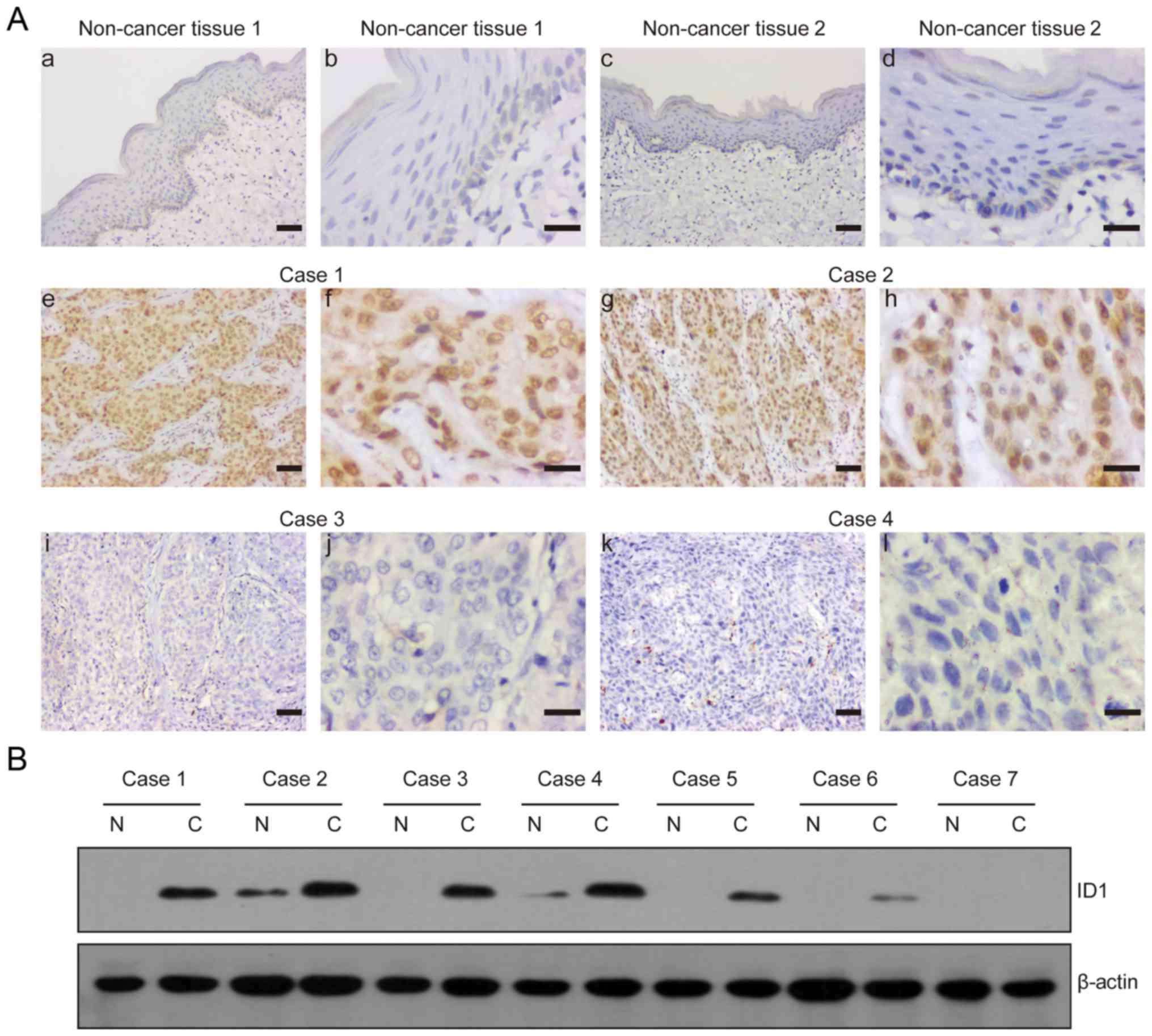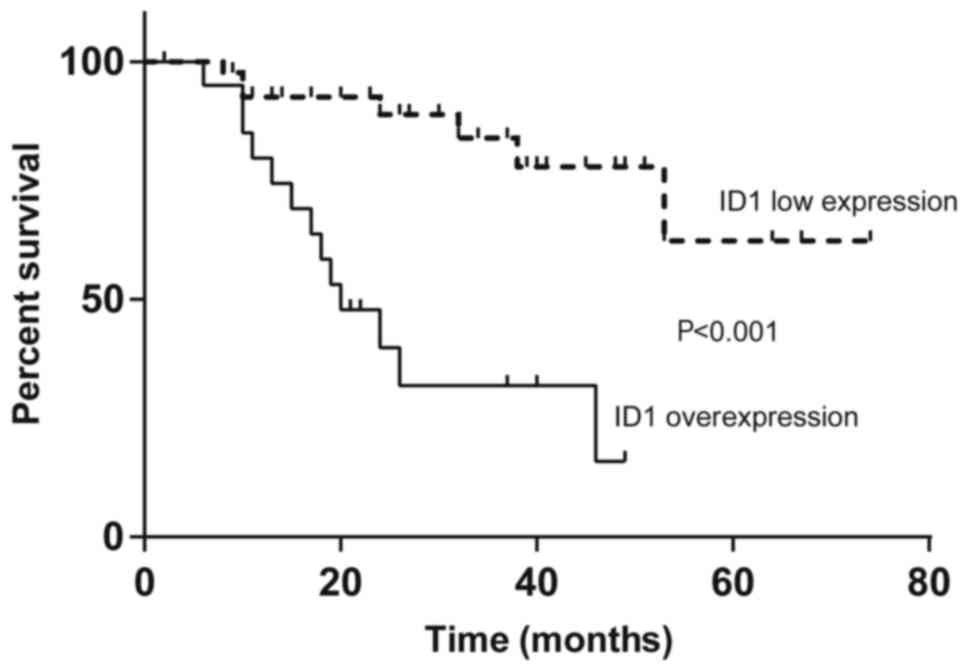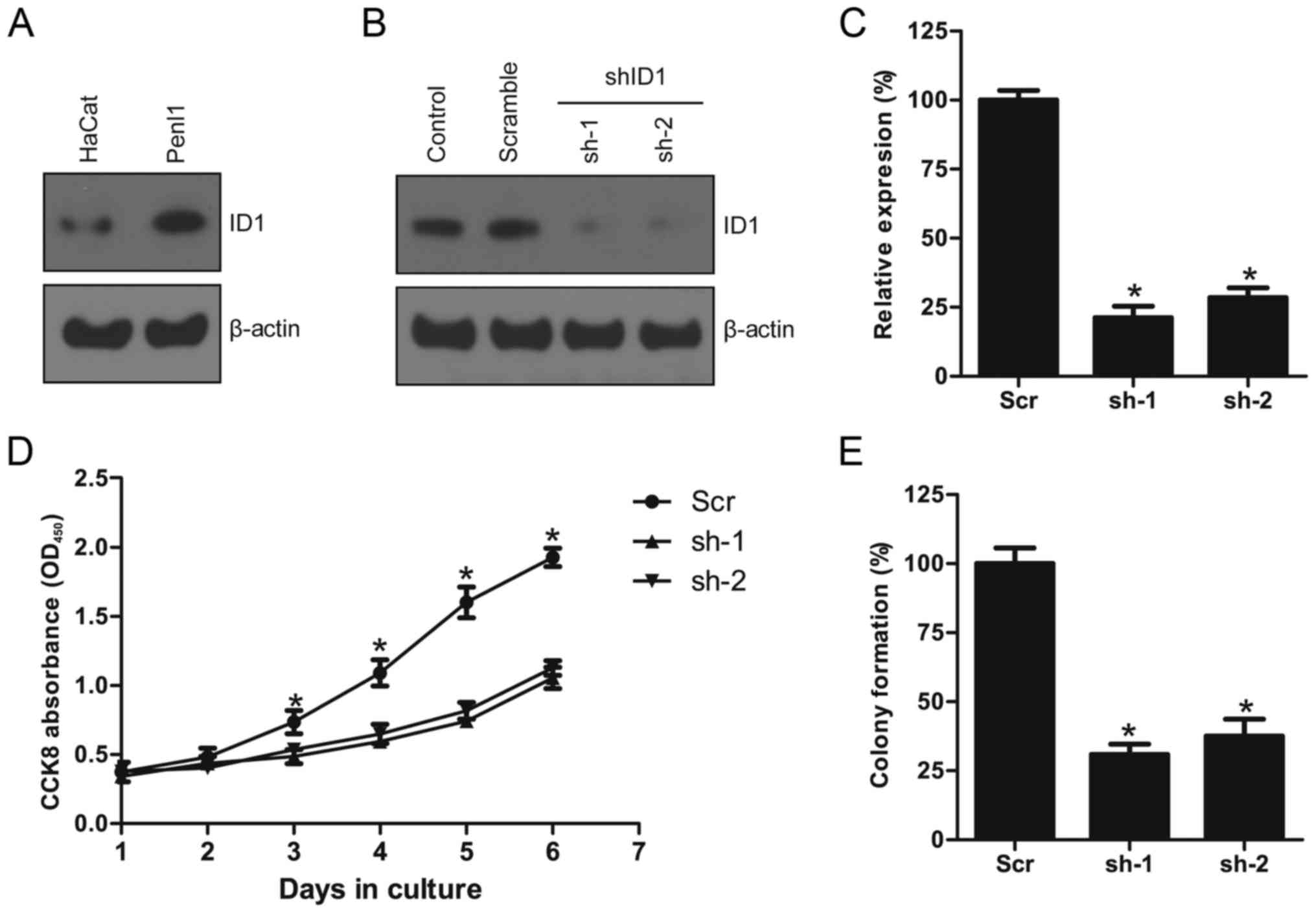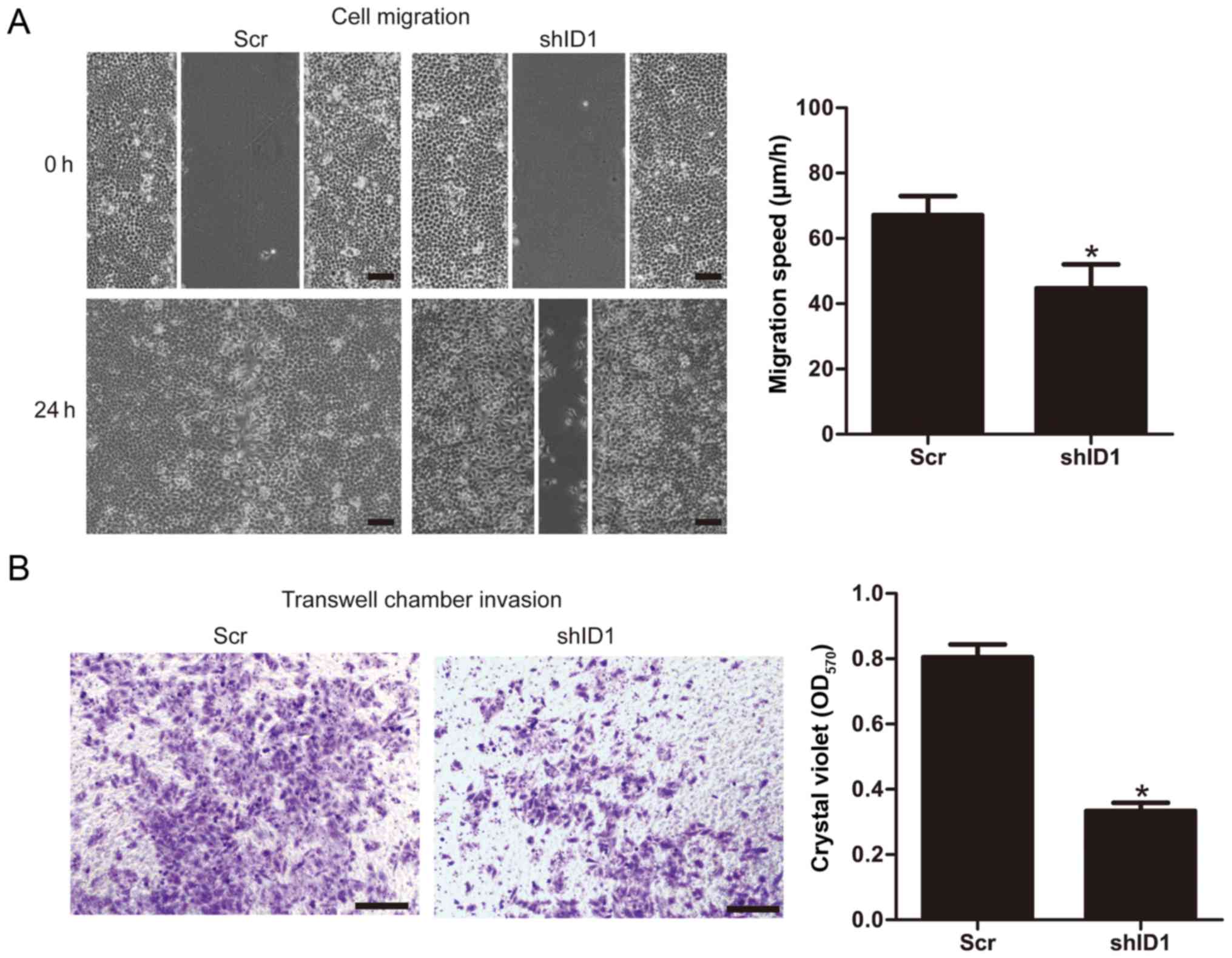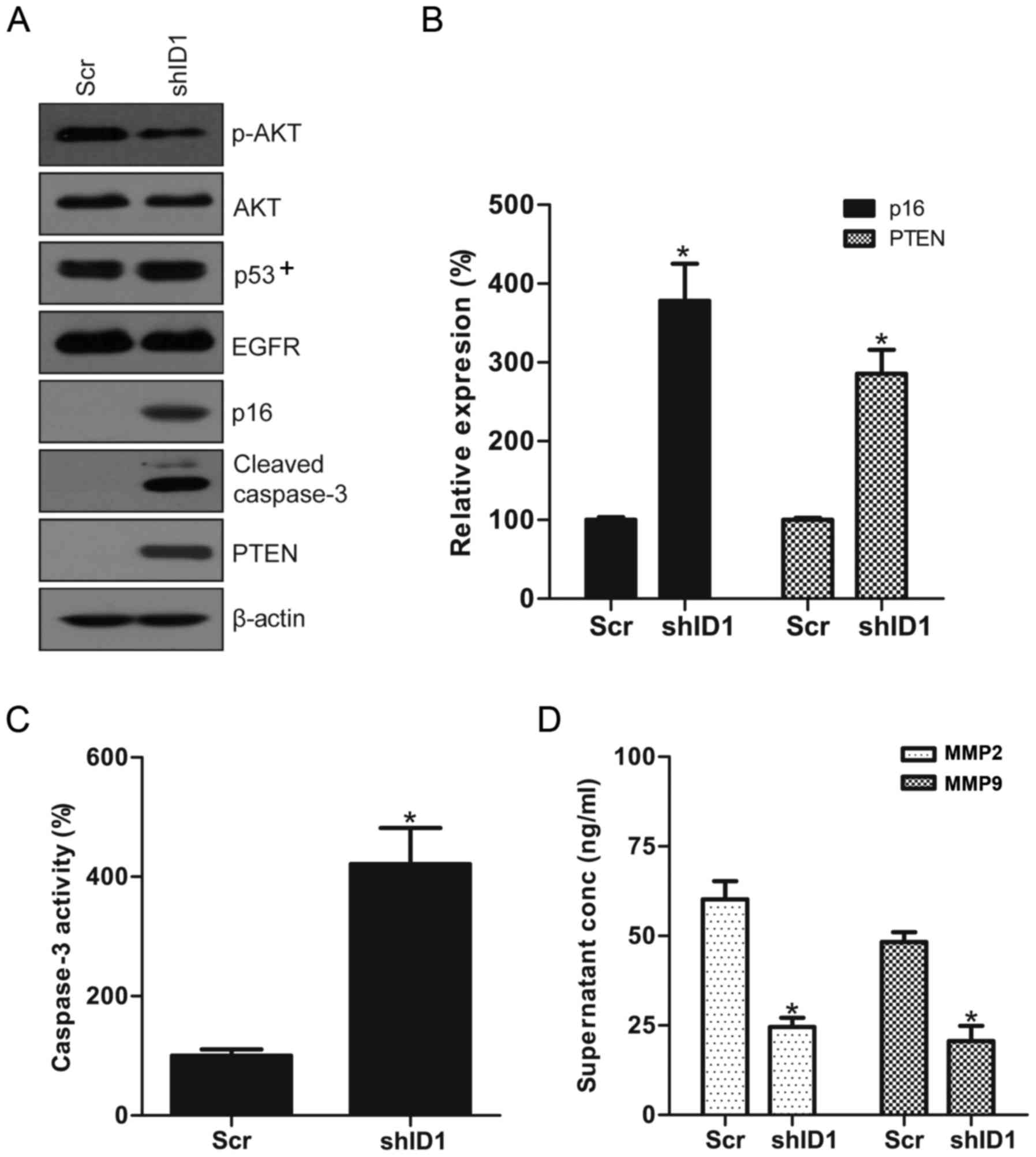|
1
|
Paner GP, Stadler WM, Hansel DE, Montironi
R, Lin DW and Amin MB: Updates in the eighth edition of the
tumor-node-metastasis staging classification for urologic cancers.
Eur Urol. 73:560–569. 2018. View Article : Google Scholar : PubMed/NCBI
|
|
2
|
Douglawi A and Masterson TA: Updates on
the epidemiology and risk factors for penile cancer. Transl Androl
Urol. 6:785–790. 2017. View Article : Google Scholar : PubMed/NCBI
|
|
3
|
Ottenhof SR, Leone AR, Horenblas S, Spiess
PE and Vegt E: Advancements in staging and imaging for penile
cancer. Curr Opin Urol. 27:612–620. 2017. View Article : Google Scholar : PubMed/NCBI
|
|
4
|
Barski D, Georgas E, Gerullis H and Ecke
T: Metastatic penile carcinoma-an update on the current diagnosis
and treatment options. Cent European J Urol. 67:126–132.
2014.PubMed/NCBI
|
|
5
|
Ficarra V, Novara G, Boscolo-Berto R,
Artibani W and Kattan MW: How accurate are present risk group
assignment tools in penile cancer? World J Urol. 27:155–60. 2009.
View Article : Google Scholar : PubMed/NCBI
|
|
6
|
Zargar-Shoshtari K, Sharma P and Spiess
PE: Insight into novel biomarkers in penile cancer: Redefining the
present and future treatment paradigm? Urol Oncol. 36:433–439.
2018. View Article : Google Scholar : PubMed/NCBI
|
|
7
|
Stankiewicz E, Ng M, Cuzick J, Mesher D,
Watkin N, Lam W, Corbishley C and Berney DM: The prognostic value
of Ki-67 expression in penile squamous cell carcinoma. J Clin
Pathol. 65:534–537. 2012. View Article : Google Scholar : PubMed/NCBI
|
|
8
|
Mannweiler S, Sygulla S, Winter E and
Regauer S: Two major pathways of penile carcinogenesis: HPV-induced
penile cancers overexpress p16ink4a, HPV-negative
cancers associated with dermatoses express p53, but lack
p16ink4a overexpression. J Am Acad Dermatol. 69:73–81.
2013. View Article : Google Scholar : PubMed/NCBI
|
|
9
|
Arya M, Thrasivoulou C, Henrique R, Millar
M, Hamblin R, Davda R, Aare K, Masters JR, Thomson C, Muneer A, et
al: Targets of Wnt/β-catenin transcription in penile carcinoma.
PLoS One. 10:e01243952015. View Article : Google Scholar : PubMed/NCBI
|
|
10
|
Ling F, Kang B and Sun XH: Id proteins:
Small molecules, mighty regulators. Curr Top Dev Biol. 110:189–216.
2014. View Article : Google Scholar : PubMed/NCBI
|
|
11
|
Perk J, Iavarone A and Benezra R: Id
family of helix-loop-helix proteins in cancer. Nat Rev Cancer.
5:603–614. 2005. View
Article : Google Scholar : PubMed/NCBI
|
|
12
|
Wong YC, Wang X and Ling MT: Id-1
expression and cell survival. Apoptosis. 9:279–289. 2004.
View Article : Google Scholar : PubMed/NCBI
|
|
13
|
Shuno Y, Tsuno NH, Okaji Y, Tsuchiya T,
Sakurai D, Nishikawa T, Yoshikawa N, Sasaki K, Hongo K, Tsurita G,
et al: Id1/Id3 knockdown inhibits metastatic potential of
pancreatic cancer. J Surg Res. 161:76–82. 2010. View Article : Google Scholar : PubMed/NCBI
|
|
14
|
Li B, Tsao SW, Li YY, Wang X, Ling MT,
Wong YC, He QY and Cheung AL: Id-1 promotes tumorigenicity and
metastasis of Human esophageal cancer cells through activation of
PI3K/AKT signaling pathway. Int J Cancer. 125:2576–2585. 2009.
View Article : Google Scholar : PubMed/NCBI
|
|
15
|
Maw MK, Fujimoto J and Tamaya T:
Overexpression of inhibitor of DNA-binding (ID)-1 protein related
to angiogenesis in tumor advancement of ovarian cancers. BMC
Cancer. 9:4302009. View Article : Google Scholar : PubMed/NCBI
|
|
16
|
Lin J, Guan Z, Wang C, Feng L, Zheng Y,
Caicedo E, Bearth E, Peng JR, Gaffney P and Ondrey FG: Inhibitor of
differentiation 1 contributes to head and neck squamous cell
carcinoma survival via the NF-kappaB/survivin and phosphoinositide
3-kinase/Akt signaling pathways. Clin Cancer Res. 16:77–87. 2010.
View Article : Google Scholar : PubMed/NCBI
|
|
17
|
Liu Q, Zhang C, Yuan J, Fu J, Wu M, Su J,
Wang X, Yuan X and Jiang W: PTK7 regulates Id1 expression in
CD44-high glioma cells. Neuro Oncol. 17:505–515. 2015. View Article : Google Scholar : PubMed/NCBI
|
|
18
|
Fu J, Yang QY, Sai K, Chen FR, Pang JC, Ng
HK, Kwan AL and Chen ZP: TGM2 inhibition attenuates ID1 expression
in CD44-high glioma-initiating cells. Neuro Oncol. 15:1353–1365.
2013. View Article : Google Scholar : PubMed/NCBI
|
|
19
|
Clark PE, Spiess PE, Agarwal N, Biagioli
MC, Eisenberger MA, Greenberg RE, Herr HW, Inman BA, Kuban DA,
Kuzel TM, et al: Penile cancer: Clinical practice guidelines in
oncology. J Natl Compr Canc Netw. 11:594–615. 2013. View Article : Google Scholar : PubMed/NCBI
|
|
20
|
Chen J, Yao K, Li Z, Deng C, Wang L, Yu X,
Liang P, Xie Q, Chen P, Qin Z, et al: Establishment and
characterization of a penile cancer cell line, penl1, with a
deleterious TP53 mutation as a paradigm of HPV-negative penile
carcinogenesis. Oncotarget. 7:51687–51698. 2016.PubMed/NCBI
|
|
21
|
Jun F, Hong J, Liu Q, Guo Y, Liao Y, Huang
J, Wen S and Shen L: Epithelial membrane protein 3 regulates TGF-β
signaling activation in CD44-high glioblastoma. Oncotarget.
8:14343–14358. 2017. View Article : Google Scholar : PubMed/NCBI
|
|
22
|
Wolff AC, Hammond ME, Schwartz JN, Hagerty
KL, Allred DC, Cote RJ, Dowsett M, Fitzgibbons PL, Hanna WM, Langer
A, et al: American Society of Clinical Oncology/College of American
Pathologists guideline recommendations for Human epidermal growth
factor receptor 2 testing in breast cancer. J Clin Oncol.
25:118–145. 2007. View Article : Google Scholar : PubMed/NCBI
|
|
23
|
Faraj SF, Chaux A, Gonzalez-Roibon N,
Munari E, Cubilla AL, Shih IeM and Netto GJ: Immunohistochemical
expression of ARID1A in penile squamous cell carcinomas: A tissue
microarray study of 112 cases. Hum Pathol. 46:761–766. 2015.
View Article : Google Scholar : PubMed/NCBI
|
|
24
|
Yang Y, Huang JQ, Zhang X and Shen LF:
MiR-129-2 functions as a tumor suppressor in glioma cells by
targeting HMGB1 and is down-regulated by DNA methylation. Mol Cell
Biochem. 404:229–239. 2015. View Article : Google Scholar : PubMed/NCBI
|
|
25
|
Li P, Tian W and Ma X: Alpha-mangostin
inhibits intracellular fatty acid synthase and induces apoptosis in
breast cancer cells. Mol Cancer. 13:1382014. View Article : Google Scholar : PubMed/NCBI
|
|
26
|
Zhang J, Fu J, Pan Y, Zhang X and Shen L:
Silencing of miR-1247 by DNA methylation promoted non-small-cell
lung cancer cell invasion and migration by effects of STMN1. Onco
Targets Ther. 9:7297–7307. 2016. View Article : Google Scholar : PubMed/NCBI
|
|
27
|
Yang C, Xu Y, Cheng F, Hu Y, Yang S, Rao J
and Wang X: miR-1301 inhibits hepatocellular carcinoma cell
migration, invasion, and angiogenesis by decreasing Wnt/β-catenin
signaling through targeting BCL9. Cell Death Dis. 8:e29992017.
View Article : Google Scholar : PubMed/NCBI
|
|
28
|
He J, Xu Q, Wang M, Li C, Qian X, Shi Z,
Liu LZ and Jiang BH: Oral administration of apigenin inhibits
metastasis through AKT/P70S6K1/MMP-9 pathway in orthotopic ovarian
tumor model. Int J Mol Sci. 13:7271–7282. 2012. View Article : Google Scholar : PubMed/NCBI
|
|
29
|
Shan N, Shen L, Wang J, He D and Duan C:
MiR-153 inhibits migration and invasion of Human non-small-cell
lung cancer by targeting ADAM19. Biochem Biophys Res Commun.
456:385–391. 2015. View Article : Google Scholar : PubMed/NCBI
|
|
30
|
Zhang JF, Wang P, Yan YJ, Li Y, Guan MW,
Yu JJ and Wang XD: IL-33 enhances glioma cell migration and
invasion by upregulation of MMP2 and MMP9 via the ST2-NF-κB
pathway. Oncol Rep. 38:2033–2042. 2017. View Article : Google Scholar : PubMed/NCBI
|
|
31
|
Hu X, Huang J, Wen S, Fu J and Chen M:
Comparison of efficacy between brachytherapy and penectomy in
patients with penile cancer: A meta-analysis. Oncotarget.
8:100469–100477. 2017.PubMed/NCBI
|
|
32
|
Leone A, Diorio GJ, Pettaway C, Master V
and Spiess PE: Contemporary management of patients with penile
cancer and lymph node metastasis. Nat Rev Urol. 14:335–347. 2017.
View Article : Google Scholar : PubMed/NCBI
|
|
33
|
Lopes A, Bezerra AL, Pinto CA, Serrano SV,
de MellO CA and Villa LL: p53 as a new prognostic factor for lymph
node metastasis in penile carcinoma: Analysis of 82 patients
treated with amputation and bilateral lymphadenectomy. J Urol.
168:81–86. 2002. View Article : Google Scholar : PubMed/NCBI
|
|
34
|
Ferrandiz-Pulido C, Masferrer E, Toll A,
Hernandez-Losa J, Mojal S, Pujol RM, Ramon y Cajal S, de Torres I
and Garcia-Patos V: mTOR signaling pathway in penile squamous cell
carcinoma: pmTOR and peIF4E over expression correlate with
aggressive tumor behavior. J Urol. 190:2288–2295. 2013. View Article : Google Scholar : PubMed/NCBI
|
|
35
|
Poetsch M, Hemmerich M, Kakies C, Kleist
B, Wolf E, vom Dorp F, Hakenberg OW and Protzel C: Alterations in
the tumor suppressor gene p16INK4A are associated with
aggressive behavior of penile carcinomas. Virchows Arch.
458:221–229. 2011. View Article : Google Scholar : PubMed/NCBI
|
|
36
|
Cubilla AL: The role of pathologic
prognostic factors in squamous cell carcinoma of the penis. World J
Urol. 27:169–177. 2009. View Article : Google Scholar : PubMed/NCBI
|
|
37
|
Sanchez DF, Soares F, Alvarado-Cabrero I,
Cañete S, Fernández-Nestosa MJ, Rodríguez IM, Barreto J and Cubilla
AL: Pathological factors, behavior, and histological prognostic
risk groups in subtypes of penile squamous cell carcinomas (SCC).
Semin Diagn Pathol. 32:222–231. 2015. View Article : Google Scholar : PubMed/NCBI
|
|
38
|
Wang JY, Gao MZ, Yu DX, Xie DD, Wang Y, Bi
LK, Zhang T and Ding DM: Histological subtype is a significant
predictor for inguinal lymph node metastasis in patients with
penile squamous cell carcinoma. Asian J Androl. 20:265–269. 2018.
View Article : Google Scholar : PubMed/NCBI
|
|
39
|
Hu XM, Lin T, Huang XY, Gan RH, Zhao Y,
Feng Y, Ding LC, Su BH, Zheng DL and Lu YG: ID1 contributes to cell
growth invasion and migration in salivary adenoid cystic carcinoma.
Mol Med Rep. 16:8907–8915. 2017. View Article : Google Scholar : PubMed/NCBI
|
|
40
|
Gupta GP, Perk J, Acharyya S, de Candia P,
Mittal V, Todorova-Manova K, Gerald WL, Brogi E, Benezra R and
Massagué J: ID genes mediate tumor reinitiation during
breast cancer lung metastasis. Proc Natl Acad Sci USA.
104:19506–19511. 2007. View Article : Google Scholar : PubMed/NCBI
|
|
41
|
Jacob JM, Ferry EK, Gay LM, Elvin JA,
Vergilio J, Ramkissoon S, Severson E, Necchi A, Killian JK, Ali SM,
et al: Comparative genomic profiling of refractory/metastatic
penile and non-penile cutaneous squamous cell carcinoma:
Implications for selection of systemic therapy. J Urol. Oct
3–2018.(Epub ahead of print). (pii): S0022-5347(18)43962-6. doi:
10.1016/j.juro.2018.09.056.
|
|
42
|
Marchi FA, Martins DC, Barros-Filho MC,
Kuasne H, Busso Lopes AF, Brentani H, Trindade Filho JC, Guimarães
GC, Faria EF, Scapulatempo-Neto C, et al: Multidimensional
integrative analysis uncovers driver candidates and biomarkers in
penile carcinoma. Sci Rep. 7:67072017. View Article : Google Scholar : PubMed/NCBI
|
|
43
|
Ali SM, Pal SK, Wang K, Palma NA, Sanford
E, Bailey M, He J, Elvin JA, Chmielecki J, Squillace R, et al:
Comprehensive genomic profiling of advanced penile carcinoma
suggests a high frequency of clinically relevant genomic
alterations. Oncologist. 21:33–39. 2016. View Article : Google Scholar : PubMed/NCBI
|
|
44
|
McDaniel AS, Hovelson DH, Cani AK, Liu CJ,
Zhai Y, Zhang Y, Weizer AZ, Mehra R, Feng FY, Alva AS, et al:
Genomic profiling of penile squamous cell carcinoma reveals new
opportunities for targeted therapy. Cancer Res. 75:5219–5227. 2015.
View Article : Google Scholar : PubMed/NCBI
|
|
45
|
Chaux A, Munari E, Katz B, Sharma R,
Lecksell K, Cubilla AL, Burnett AL and Netto GJ: The epidermal
growth factor receptor is frequently overexpressed in penile
squamous cell carcinomas: A tissue microarray and digital image
analysis study of 112 cases. Hum Pathol. 44:2690–2695. 2013.
View Article : Google Scholar : PubMed/NCBI
|
|
46
|
Silva Amancio AM, Cunha IW, Neves JI,
Quetz JD, Carraro DM, Rocha RM, Zequi SC, Cubilla AL, da Fonseca
FP, Lopes A, et al: Epidermal growth factor receptor as an adverse
survival predictor in squamous cell carcinoma of the penis. Hum
Pathol. 61:97–104. 2017. View Article : Google Scholar : PubMed/NCBI
|
|
47
|
Pillai S, Rizwani W, Li X, Rawal B, Nair
S, Schell MJ, Bepler G, Haura E, Coppola D and Chellappan S: ID1
facilitates the growth and metastasis of non-small cell lung cancer
in response to nicotinic acetylcholine receptor and epidermal
growth factor receptor signaling. Mol Cell Biol. 31:3052–3067.
2011. View Article : Google Scholar : PubMed/NCBI
|
|
48
|
Ding Y, Wang G, Ling MT, Wong YC, Li X, Na
Y, Zhang X, Chua CW, Wang X and Xin D: Significance of Id-1
up-regulation and its association with EGFR in bladder cancer cell
invasion. Int J Oncol. 28:847–854. 2006.PubMed/NCBI
|
|
49
|
Prowse DM, Ktori EN, Chandrasekaran D,
Prapa A and Baithun S: Human papillomavirus-associated increase in
p16INK4A expression in penile lichen sclerosus and
squamous cell carcinoma. Br J Dermatol. 158:261–265. 2008.
View Article : Google Scholar : PubMed/NCBI
|
|
50
|
Adimonye A, Stankiewicz E, Kudahetti S,
Trevisan G, Tinwell B, Corbishley C, Lu YJ, Watkin N and Berney D:
Analysis of the PI3K-AKT-mTOR pathway in penile cancer: Evaluation
of a therapeutically targetable pathway. Oncotarget. 9:16074–16086.
2018. View Article : Google Scholar : PubMed/NCBI
|
|
51
|
Lee TK, Man K, Ling MT, Wang XH, Wong YC,
Lo CM, Poon RT, Ng IO and Fan ST: Over-expression of Id-1 induces
cell proliferation in hepatocellular carcinoma through inactivation
of p16INK4a/RB pathway. Carcinogenesis. 24:1729–1736.
2003. View Article : Google Scholar : PubMed/NCBI
|
|
52
|
Alani RM, Young AZ and Shifflett CB: Id1
regulation of cellular senescence through transcriptional
repression of p16/Ink4a. Proc Natl Acad Sci USA. 98:7812–7816.
2001. View Article : Google Scholar : PubMed/NCBI
|
|
53
|
Lee JY, Kang MB, Jang SH, Qian T, Kim HJ,
Kim CH, Kim Y and Kong G: Id-1 activates Akt-mediated Wnt signaling
and p27Kip1 phosphorylation through PTEN inhibition.
Oncogene. 28:824–831. 2009. View Article : Google Scholar : PubMed/NCBI
|















